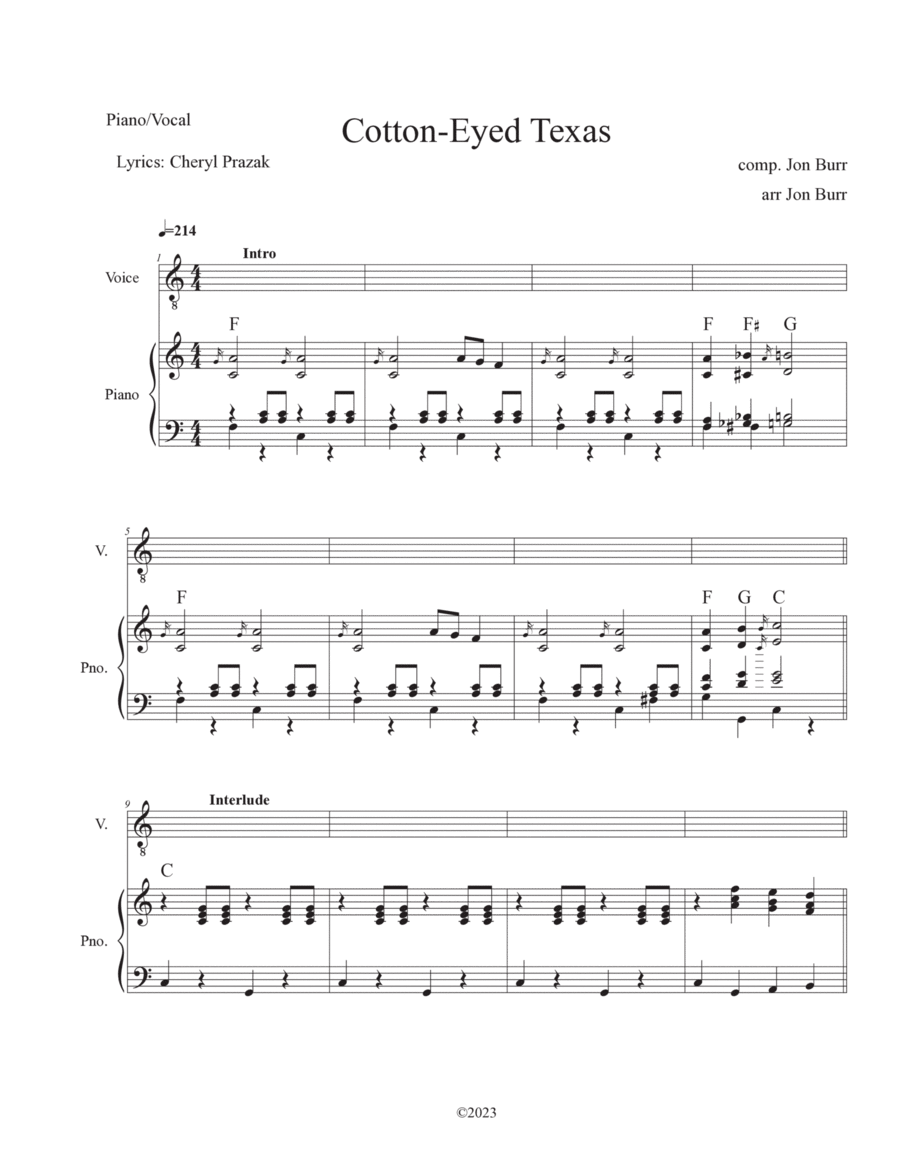Piano,Vocal,Voice - Level 3 - Digital Download SKU: A0.1309904 By Cheryl Prazak. By Lyrics: Cheryl Prazak and Music: Jon Burr. Arranged by Jon Burr. Country,Folk,Traditional. Score. 17 pages. Cheryl Prazak #899036. Published by Cheryl Prazak (A0.1309904). Cotton-Eyed Texas is a celebration of all good things Texan.Lyrics by Cheryl Prazak, music by Jon Burr Arranging, production and video by Jon Burr (arrangerforhire.com)Lyric:Let me tell you âbout a place thatâs stood the test of timeOnce it was a country, but now a State of MindTexas is the place I know, itâs special and itâs reallet me share some things itâs got you oughtta see and feelDo-si-do with fiddle and bow, Texas two-step and Cotton-Eyed Joe,heel and toe, do-si-do, Texas two-step and Cotton-Eyed Joe,We belt it out with Jennings, echo through the hills,rave with Buddy Holly, âah-hahâ with the great Bob Wills.We croon with Kenny Rogers, George Strait and young Clint Black.We dance the Texas two-step to Galveston and backDo-si-do with fiddle and bow, Texas two-step and Cotton-Eyed Joe,heel and toe, do-si-do, Texas two-step and Cotton-Eyed Joe,Texas has its mountains and plains, valleys and bayous.We had cottonfields once where legendary pickers grew,Like Lightninâ Hopkins, T-Bone, Blind Lemon, Stevie Ray played the bluesBuddy Holly, and Willie Nelson sang their stories tooDo-si-do with fiddle and bow, Texas two-step and Cotton-Eyed Joe,heel and toe, do-si-do, Texas two-step and Cotton-Eyed Joe,Us Texans like to hunt and shoot, and what we shoot, we eat.When you smell the bar-b-cue, bring a dish ân grab a seat.Tex-Mex, tacos, fajitas, enchiladas and red wine!Avocado guacamole suits a Texan just fine!Do-si-do with fiddle and bow, Texas two-step and Cotton-Eyed Joe,heel and toe, do-si-do, Texas two-step and Cotton-Eyed Joe,Do-si-do with fiddle and bow, Texas two-step and Cotton-Eyed Joe,heel and toe, do-si-do, Texas two-step and Cotton-Eyed Joe,We have fought to live our way, and we can fight again.When the need presents itself, we only fight to win.We have fought to live our way, we can live no other.If you feel like coming this way, donât mess with Texas, brother!Do-si-do with fiddle and bow, Texas two-step and Cotton-Eyed Joe,heel and toe, do-si-do, Texas two-step and Cotton-Eyed Joe,Texas has its music, Texas has its foodTexas has its history to put you in the moodThe very best way to visit is to travel far and wideone end to the other right through the countrysideDo-si-do with fiddle and bow, Texas two-step and Cotton-Eyed Joe,heel and toe, do-si-do, Texas two-step and Cotton-Eyed Joe,Do-si-do with fiddle and bow, Texas two-step and Cotton-Eyed Joe,heel and toe, do-si-do, Texas two-step and Cotton-Eyed Joe
